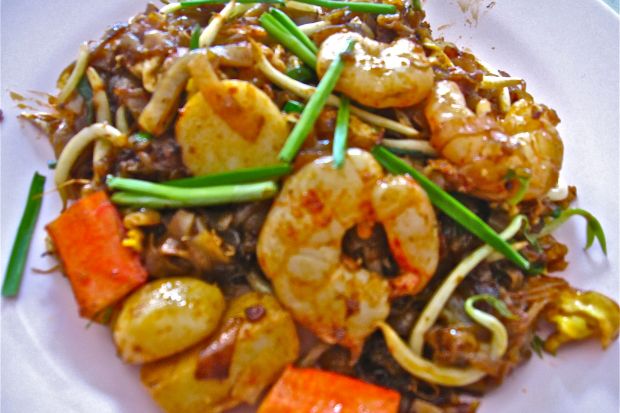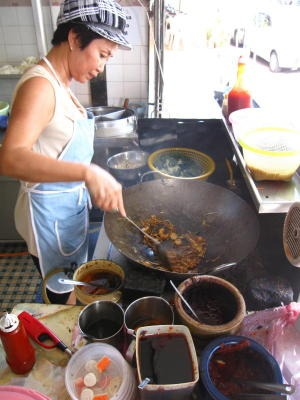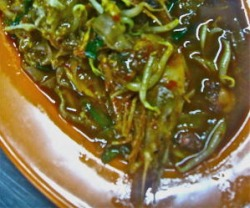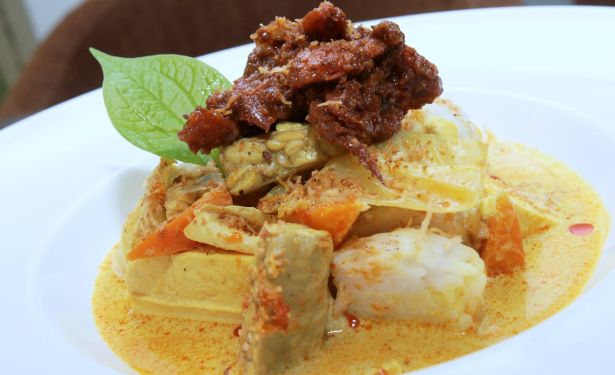There are many places in Penang to find pork-free char kuey teow.
PENANG char kuey teow is the best in the world – the undisputed champion as far as stir-fried flat noodles go.
That is according to the Federation of Penang Hawkers president Lam Tong Ying.
He claims that foreign tourists from Germany, the United States and Britain all tell him excitedly how superior this popular street food is.
“Go to Singapore and you will see signages at food courts that scream ‘Penang char kuey teow’ – it’s like a brand and an assurance of quality,” he says proudly.
While Lam was referring to char kuey teow (spelled char koay teow in Penang) cooked with pork, the pork-free version available here is equally delicious and aromatic.
The most famous pork-free version of the dish is arguably served in Sungai Dua (exit near the Sungai Dua toll) on the mainland but the island has its fair share of wok masters to boast of.
Can the oil
Angie Ng, or Ah Lien, as she is fondly known among regulars, runs Kedai Kopi Bee Hwa in Leboh Dickens, George Town.
Since 1992, she has been serving pork-free char kuey teow, kuey teow soup, mee udang, curry mee, nasi goreng, mee Hailam and wantan mee goreng but it’s her fried flat noodles that are the best seller.
“I use vegetable oil instead of lard and my Chinese customers have no complaints,” she says.
Her coffeeshop (which, by the way, is one of the cleanest in town) does not serve pork or beef and the ingredients used, including the chicken, are halal.
“When I started my business here, the neighbouring shops served Malay and Indian food so out of respect, I choose not to serve pork or beef and use only halal ingredients in my cooking,” she explains.
Much as I enjoy a hearty char kuey teow meal, it usually leaves my throat feeling “clogged” with oil. What I love about Ah Lien’s dish is that it isn’t at all oily.
Her version is satisfying, yet somehow tastes healthier (the lack of oil stains on the plate after the meal might explain why).
Generous portions of prawns, crabsticks and fishballs put hers among my favourite char kuey teow stalls – lard or no lard.
Action man
Having done it for the past 35 years, Pawan Jalaluddin Ismail is an old hand in the char kuey teow business and could probably serve up a delicious plate in his sleep.
He runs a stall at the Kompleks Lebuh Nipah food court in Bukit Jambul and he is there daily from 8am to 11am except Mondays.
The 64-year-old learnt the recipe and skill from his Chinese mother-in-law and admits she was not an easy taskmaster.
“Of course I kena marah (got scolded) a lot initially – my char kuey teow was either too salty or too bland.
“It took me six months to get it right before my mother-in-law gave me the thumbs up,” he recalls.
A former clerk, Pawan Jalaluddin credits his wife for encouraging him to pick up the wok.
“She thought it would be a good idea for me to learn to cook so that we could earn some extra income. Back then, I would work in the morning and sell char kuey teow at night in Bayan Baru.
“It was only about seven years ago after my retirement that I started selling in the mornings,” he says.
Asked if his wife, who he says can also prepare a mean plate of char kuey teow, is better in the kitchen, he laughs sheepishly.
Looking fit and healthy in a sporty T-shirt and jeans, he could easily pass off for a man in his 50s.
Pawan Jalaluddin acknowledges that charcoal heat is better for cooking as “it keeps the dish hotter longer” but the fuel is just too expensive to use.
“I used to cook using charcoal but it’s too pricey now. Using gas doesn’t affect the taste but it does cause the dish to get cold faster, so immediately after it comes off the wok, I have to quickly serve it,” he says.
The heat of the gas stove, heavy wok and non-stop ladle action doesn’t seem to take a toll on him – customers make a beeline to his stall the minute the roller shutters go up and he is ready for action.
Unlike the typical Malay-style char kuey teow which is wet, his is typical of Chinese-style fried flat noodles except that no pork or lard is used.
Another difference is that customers can request for pickled green chillies for that added zing.
“Some of my Malay customers ask why my char kuey teow is so dry but I always smile and tell them to see how the Chinese char kuey teow is prepared.
“If it is too wet, then it should be called kuey teow soup, not char kuey teow, right?
“Mine is authentically Chinese char kuey teow except that it’s halal,” he explains.
Saucy secret
Fifteen minutes away from Pawan Jalaluddin’s stall, a group of friends run a very popular Malay eatery called Sany Char Koay Teow.
A few stalls down from the famous Snake Temple in Bayan Lepas, the name doesn’t exactly do justice to the shop.
After all, it opened as a humble hawker stall in 1992 and has since morphed into a huge open kitchen where several cooks work non-stop to prepare authentic masakan kampung dishes like the lip-smacking tom yam and daging masak pedas.
The char kuey teow is only one of some 20 items on the menu.
They also serve a variety of nasi goreng – though delicious, this dish has yet to reach the popularity of the char kuey teow.
After all, the signage at the shop proudly claims it to be “the best fried kuey teow in town”.
Owner Azman Che Endot, 37, shares the secret to his famous char kuey teow.
“It’s in the kicap (sauce).
“When Sany, myself and six others started this business, we never imagined it would grow to be what it is today.
“We were all in our late teens and had worked in various odd jobs, learning to cook along the way, before deciding to pool our experiences and resources to set up Sany Char Koay Teow.
“Since then, Sany has moved to KL and has opened a few branches there.
“Only three of us from the original eight remain partners here,” he says, adding that what goes into the special kicap (which is for sale) is known only to the group of friends who started the business.
The Kedahan learnt to cook from his sisters and helped out at their stall at the tender age of 14.
“I just wasn’t a very good student in school so I worked with hawkers, selling everything from tom yam to nasi campur and pasembur.
“I also had a stint at a fast food outlet selling fried chicken but eventually found that frying kuey teow was my calling – it’s easy to prepare and all the ingredients you need are prawns and cockles,” he says.
Azman is unperturbed when asked if bottling his sauce for sale would result in more competition for his thriving eatery.
He says the sauce alone does not a tasty plate of char kuey teow make – it also requires stir-frying mastery that can only be acquired through experience.
“We are old hands in this business – we do it every day that it’s almost automatic how much of what ingredient to put in so that makes a difference to the taste.
“I can sell you the kicap but your cooking style will still differ from mine,” he points out matter-of-fact.
A watery mix of the secret sauce and egg gives the char kuey teow here its rich lemak taste but Azman notes that there are some customers who request for a dry version of his shop’s signature dish.
Like Pawan Jalaluddin, Azman agrees that charcoal is better than gas when it comes to char kuey teow but says it is inconvenient.
Charcoal or not, plates of Sany Char Koay Teow literally fly off the wok from the moment the place opens at 5.30pm until 2.30am daily.
During dinner time, the sight of waiters weaving past the tables while balancing six plates of piping hot flat noodles every other minute is the norm.
Serving some 400 plates per night on average is, after all, common.
During the weekends and holidays, it gets a little crazier.
Often, it’s so busy that Azman himself has no qualms getting his hands dirty.
“Yes, I still clear the tables, take orders and serve despite having quite a number of workers.
“A tauke (boss) must lead by example. I want my staff to leave here having learned something and if they go on to open their own stalls later on, I won’t begrudge them.
“What’s important is that Sany customers can continue to enjoy the dish regardless of whose stall they patronise – it’s like continuing a legacy.
“That’s part of the reason why I’m not worried about selling our kicap even to competitors,” he says.
Azman also caters for functions and can be reached at 019-456 5493.
Gravy train
Like Sany, Lis Char Koay Teow in Bayan Baru (opposite the Sunshine Square supermarket) boasts an extensive menu that includes Western fare and fried rice but it’s the flat noodles that keep the crowd coming.
Fondly dubbed “char kuey teow bawah pokok” by regulars (because of the huge, shady tree landmark), the plucky owner’s thriving business is five minutes away from Azman’s eatery.
Having been around for some 18 years, Lis thanks her godmother for showing her the ropes.
“Being Chinese, her style of frying the flat noodles was to keep them dry but when she taught me to do it, she told me to do a much ‘wetter’ version.
“She said it would set my char kuey teow apart from the competition and she was right,” Lis recalls fondly.
The 41-year-old’s business has become so busy that she has a crew of hired hands to man the wok while she supervises.
“I can’t stand the heat and smoke because I have asthma so I don’t do the frying anymore but the taste is still ‘100% Lis’ because of my secret sauce mix,” she says reassuringly.
Unlike others, Lis deep fries her huge prawns separately until they are golden brown before throwing them into the wok with the kuey teow.
She says this is so that only minimal oil is needed to fry the noodles.
“Customers these days are very health-conscious and don’t like their noodles dripping with oil.
“Also, the secret sauce mix is the last ingredient to go in, which is why my char kuey teow is the wettest in town,” she says in mock whisper.
The self-confessed char kuey teow addict says the stir-frying should take no more than a minute or the flat noodles will get soggy.
Lis opens daily from 6pm to 2.30am. For catering enquiries, call 012-470 9355.







